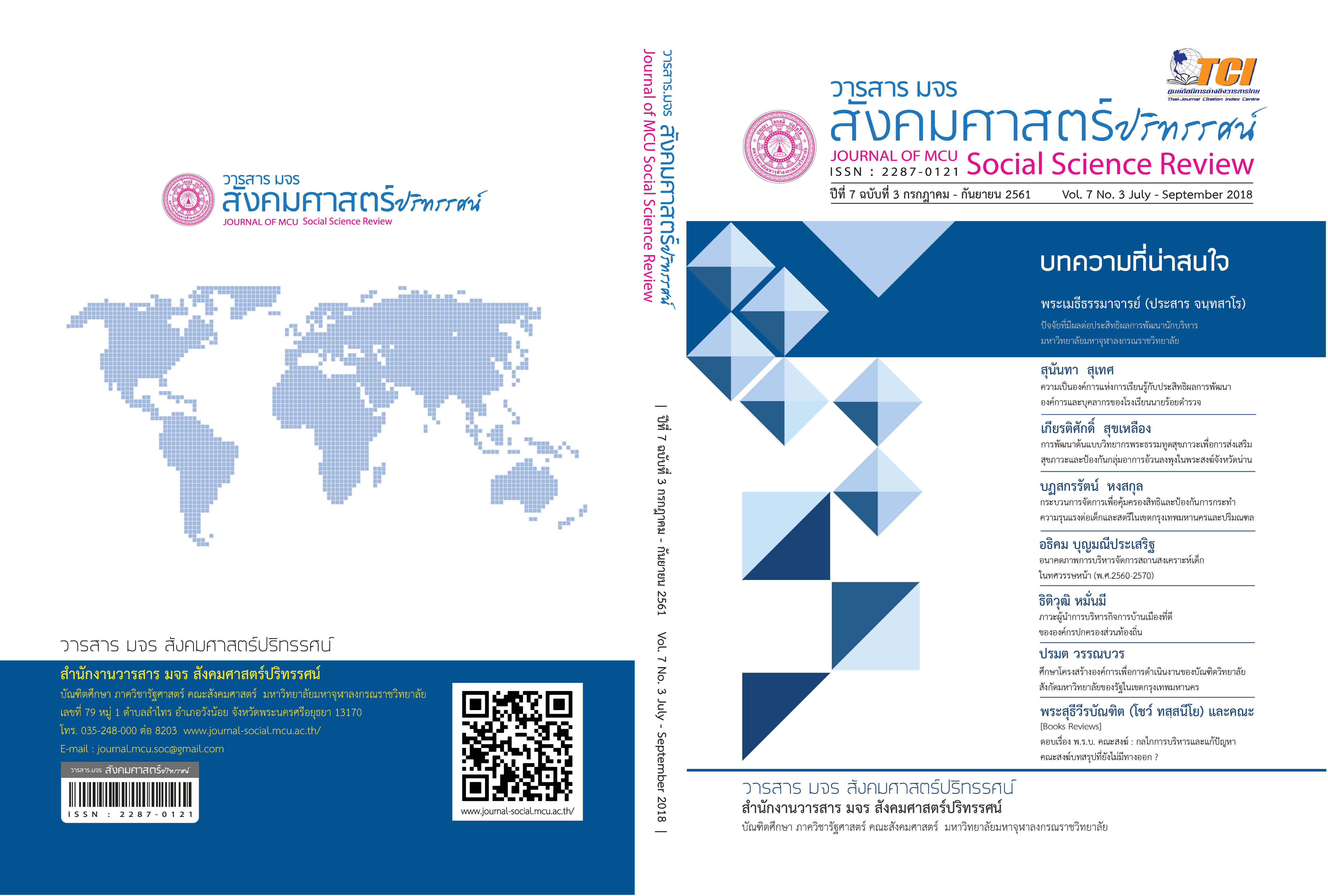การพัฒนารูปแบบการบริหารจัดการการสอนศีลธรรมของมหาวิทยาลัยสงฆ์ ในสถานศึกษาขั้นพื้นฐาน
คำสำคัญ:
การพัฒนารูปแบบ, การบริหารจัดการการสอนศีลธรรม, สถานศึกษาขั้นพื้นฐานบทคัดย่อ
บทความนี้มีวัตถุประสงค์ 1) เพื่อศึกษาสภาพการบริหารจัดการการสอนศีลธรรมของ
มหาวิทยาลัยสงฆ์ ในสถานศึกษาขั้นพื้นฐาน 2) เพื่อนาเสนอรูปแบบการบริหารจัดการการสอน
ศีลธรรมของมหาวิทยาลัยสงฆ์ ในสถานศึกษาขั้นพื้นฐาน ใช้วิจัยวิธีเชิงผสม เครื่องมือที่ใช้ได้แก่
แบบสอบถามผู้บริหาร เจ้าหน้าที่ และพระสอนศีลธรรม จานวน 385 คน และแบบสัมภาษณ์
ผู้ทรงคุณวุฒิ 9 คน วิเคราะห์ข้อมูลโดยใช้โปรแกรมสาเร็จรูป และใช้สถิติเชิงพรรณนา ได้แก่ ค่าร้อย
ละ ค่าเฉลี่ย ส่วนเบี่ยงเบนมาตรฐานและการวิเคราะห์เนื้อหา
ผลการวิจัยพบว่า
1. มหาวิทยาลัยสงฆ์ มีการบริหารจัดการการสอนศีลธรรมในสถานศึกษาขั้นพื้นฐาน
ภาพรวมการบริหารจัดการทั้ง 8 ด้าน อยู่ระดับมาก โดยด้านการสื่อสารองค์กร ด้านการปฏิบัติการ
ด้านการดาเนินการ ด้านการตรวจการ และด้านการทบทวน อยู่ระดับมาก ส่วนด้านการวิเคราะห์
ด้านการวางแผนและด้านการควบคุม อยู่ระดับปานกลาง ในด้านปัญหาการบริหารจัดการ พบว่า
ทั้งภาพรวมและจาแนกเป็นรายด้าน อยู่ระดับปานกลาง
ประกอบด้วย (1) แนวคิด ที่นาหลักอริยมรรคมีองค์ 8 มาเป็นแนวทางในการบริหาร
จัดการ เกิดเป็นระบบการบริหารแบบ 8 R Model (2) ระบบการของการบริหารจัดการตามรูปแบบ
ได้แก่ การวิเคราะห์ การวางแผน การสื่อสารองค์กร การปฏิบัติการ การดาเนินการ การติดตามและ
ตรวจสอบ การทบทวนและปรับปรุง และการควบคุมและรายงาน (3) กระบวนการบริหารจัดการ
ตามรูปแบบ ได้แก่ สภาพแวดล้อมของงานสอนศีลธรรม ปัจจัยการบริหารจัดการ คือ งานบุคคล
งบประมาณ งานวิชาการ และงานบริหารทั่วไป ขั้นตอนการดาเนินงาน เริ่มตั้งแต่การเสนอคาขอ
งบประมาณ การเตรียมความพร้อมบุคลากร การรับสมัครและพัฒนาพระสอนศีลธรรม การส่งพระ
สอนออกปฏิบัติงานสอน การแนะแนว ติดตาม และประเมินผล การรายงานผลกการดาเนินงาน
และผลผลิต (4) ข้อดี ของรูปแบบการบริหารจัดการ คือ การสร้างองค์กรแห่งคุณธรรม มีความ
สอดคล้องกับองค์กรทางสังคมไม่แสวงหากาไรหรือรายได้ เสริมพลังทางการบริหารจัดการการศึกษา
(5) ข้อจากัดของรูปแบบการบริหารจัดการ คือ อาจเกิดการต่อต้านจากบุคลากรที่มีความไม่โปร่งใส
ขาดความรับผิดชอบ และในระยะแรกบุคลากรอาจจะมีภาระความรับผิดขอบมากขึ้น (6) เงื่อนไข
ของความสาเร็จในการนารูปแบบไปใช้ คือ จะต้องถ่ายทอดกระบวนการบริหารจัดการสู่บุคลากรทุก
ระดับ ประสานความร่วมมือในด้านต่าง ๆ และเร่งพัฒนาเครือข่าย
ดาวน์โหลด
เผยแพร่แล้ว
รูปแบบการอ้างอิง
ฉบับ
ประเภทบทความ
สัญญาอนุญาต
ลิขสิทธิ์ (c) 2018 วารสาร มจร สังคมศาสตร์ปริทรรศน์

อนุญาตภายใต้เงื่อนไข Creative Commons Attribution-NonCommercial-NoDerivatives 4.0 International License.
เพื่อให้เป็นไปตามกฎหมายลิขสิทธิ์ ผู้นิพนธ์ทุกท่านต้องลงลายมือชื่อในแบบฟอร์มใบมอบลิขสิทธิ์บทความให้แก่วารสารฯ พร้อมกับบทความต้นฉบับที่ได้แก้ไขครั้งสุดท้าย นอกจากนี้ ผู้นิพนธ์ทุกท่านต้องยืนยันว่าบทความต้นฉบับที่ส่งมาตีพิมพ์นั้น ได้ส่งมาตีพิมพ์เฉพาะในวารสาร มจร สังคมศาสตร์ปริทรรศน์ เพียงแห่งเดียวเท่านั้น หากมีการใช้ภาพหรือตารางหรือเนื้อหาอื่นๆ ของผู้นิพนธ์อื่นที่ปรากฏในสิ่งตีพิมพ์อื่นมาแล้ว ผู้นิพนธ์ต้องขออนุญาตเจ้าของลิขสิทธิ์ก่อน พร้อมทั้งแสดงหนังสือที่ได้รับการยินยอมต่อบรรณาธิการ ก่อนที่บทความจะได้รับการตีพิมพ์ หากไม่เป็นไปตามข้อกำหนดเบื้องต้น ทางวารสารจะถอดบทความของท่านออกโดยไม่มีข้อยกเว้นใดๆ ทั้งสิ้น





